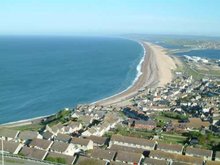Isle of Portland
|
|
Dorset_pl_from_ac.jpg
The Isle of Portland is a 4 mile (6 km) long by 1.5 mile (2.4 km) wide limestone island in the English Channel. It is near Weymouth in Dorset. The island is connected to the mainland by a large pebble tombolo called Chesil Beach, and by the A354 road bridge to Weymouth.
The island is a central part of the Jurassic Coast World Heritage Site.
The island comprises several distinct settlements, the largest being Fortuneswell and Easton, the other villages are Weston, Southwell, Castletown and the Grove.
Portland gives its name to one of the British Sea Areas.
In Thomas Hardy's Wessex the "Isle of Slingers" is based on Portland, with Street of Wells representing Fortuneswell and The Beal is Portland Bill.
History
Portland has been inhabited since at least the middle stone age. There is strong evidence of Mesolithic inhabitants near Portland Bill, and of all ages since. The island was occupied by the Romans, who reputedly called the Island "Vindilis" (although there is no exidence to support this). One of England's best loved authors Thomas Hardy called Portland "The Isle of Slingers", as it is well-documented that the inhabitants were expert stone-throwers in the defence of their island.
Portland is recorded in an Anglo Saxon Chronicle as the site of the earliest Viking raid on mainland England in the year 789.
Portland Castle was built by Henry VIII in 1539 in response to attacks by France, and cost £4,964 to construct. The castle is one of the best preserved castles from this period of British history. It is now a jewel in English Heritage's munuments and is open to the public.
The island is an ancient Royal Manor and was recorded as "being held by the king" in the Domesday Book. It was the crown who opened many of the quarries which make Portland famous. After the Great Fire of London Christopher Wren used six million tons of white Portland limestone to rebuild much of London, and some well known buildings which are built of Portland Stone include St Paul's Cathedral in London and the headquarters of the United Nations in New York City. After World War I a dedicated quarry was opened to provide stone for the Whitehall Cenotaph and half a million gravestones. A further 800,000 gravestones were carved after World War II. Portland Stone is still used to renovate and expand some of the world's most prestigious buildings, a recent example being the British Museum.
Dorset_pl_sp_26.jpg
Portland harbour, at 2130 acres (9 km²), is one of the largest man-made harbours in the world. The first stone was laid by Prince Albert in 1849, and the last stone of the first phase by Albert Edward, Prince of Wales, in 1872. The breakwaters were constructed mainly civilian contractors but all the stone was quarried by convicts. 22 men lost their lives during its construction. The breakwaters contain 5,731,376 tons of stone and cost, in 1871, £1,167,852. The final cost was much higher.
The island and its harbour were home to much of the Royal Navy during World War II, and because of this the island was heavily bombed. Much of the naval base closed at the end of the Cold War, and the Royal Naval Air Station closed in 1998. The island is still home to HM Prison Portland and HMYOI Portland, and the harbour contains Britain's only prison ship, HMP Weare, but this will leave at the end of 2005.
The harbour is now in civilian hands as 'Portland Port'
A major development at the start of the 21st century is the establishment of England's National Sailing Academy on the southern shore of Portland harbour. This is now an Olympic class facility.
The southern tip of the island, Portland Bill, is home to a lighthouse. Refurbished in 1996 the lighthouse is now entirely computer controlled. Two earlier lighthouses stand slightly further inland, one of which is now an important bird observatory used by ornithologists.
For more information the full story of Portland is told in the book "Portland, An Illustrated History" by Stuart Morris (The Dovecote Press).
External links
- [1] (http://www.dovecotepress.com/)
- Weymouth & Portland borough council (http://www.weymouth.gov.uk/)
- History of Portland (http://www.thedorsetpage.com/locations/Place/P120.htm)
- Portland Sculpture & Quarry Trust (http://psqt.org.uk/)
- Dr Ian West's Dorset geology pages (http://www.soton.ac.uk/~imw/portbib.htm) (Southampton University)
- Geoff Kirby's exploring Portland pages (http://www.geoffkirby.co.uk/Portland/)
- Broadcroft Quarry Nature Reserve (http://www.butterfly-conservation.org/index.html?/reserves/broadcroft_quarry/index.html)
- Portland Castle Museum (http://www.information-museums.co.uk/museum.php?id=20)
- Portland Bird Observatory and Field Centre (http://www.portlandbirdobs.btinternet.co.uk/)
Photographs
- More from the photographer of the images on this page (http://www.steinsky.me.uk/Portland.php)
- Pictures of England: Portland (http://www.picturesofengland.com/Portland/)
- A panorama taken from Portland Bill (http://www.weymouthpanorama.co.uk/wp088.htm)de:Isle of Portland

